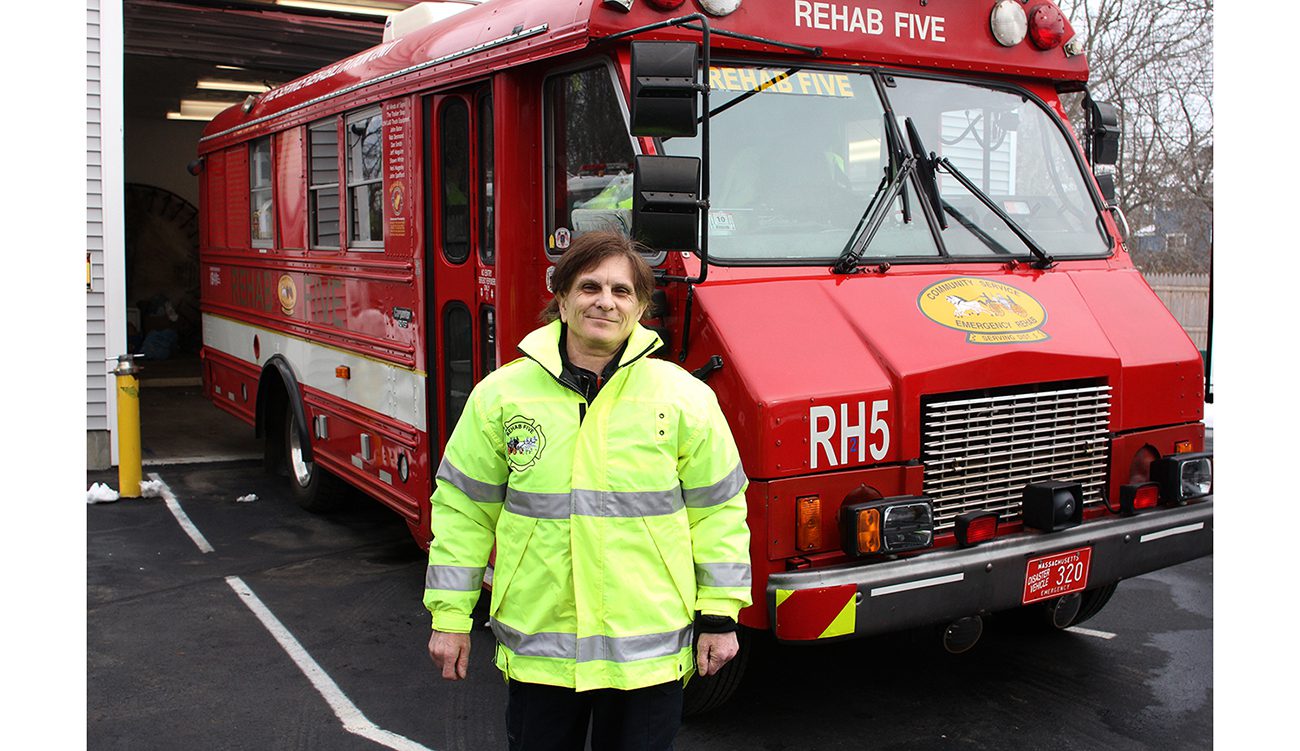PEABODY — Firefighters help people and save lives every day, but they turn to Roger Baker when they need a few minutes of rest from doing their physically-demanding jobs.
Baker operates Rehab Five out of his home near Andover Street with assistance from volunteers who rush with him to an estimated 130 fires annually. Baker said he spent three weeks at the November 2006 scene of a neighborhood-leveling explosion in Danvers, providing a warm place to rest and hot drinks for firefighters.
Rehab Five rushed to a Wakefield church fire last October where Baker parked a school bus converted into a canteen truck equipped with hot chocolate, soup, water, Gatorade, hand warmers, gloves and socks.
“It seems like I’ve done this forever,” Baker said.
He’s not exaggerating. Marblehead Fire Chief Jason Gilliland remembers when Baker was a high school student delivering water to fire scenes on his bicycle.
“Roger has been huge for the fire service over the years,” Gilliland said.
Baker grew up off Stanley Road in Swampscott and started spending time at an early age at the Burrill Street fire station. His love for firefighting history and details of fire service operations prompted him to earn a degree in fire science from North Shore Community College.
In 1986 he converted an ambulance to a canteen truck at the suggestion of a firefighter who pointed out what Baker already knew: Firefighters can spend hours, even longer, at big fires or other disasters and they need water, nutrition and replacement socks and gloves to continue doing their tough jobs safely and effectively.
He launched Rehab Five as a nonprofit service paid for principally from the salary he earns as an employee at the Lawrence polymer factory of his father, Robert. The name comes from a term firefighters use to describe the work they do after extinguishing a fire. “Five” refers to the mutual aid system that ensures fire departments receive backup assistance from other departments. The system is divided into districts. District 5 includes Peabody, Lynnfield, Marblehead, Nahant, Swampscott and Saugus.
Baker initially began providing cool drinks and soup at fire scenes. In the 1990s, when firefighters began wearing more fire-resistant pants and coats called “bunker gear,” Baker ramped up the hydrating liquids he brought to fire scenes to help counteract exhaustion and set up cooling tents in the summer equipped with misting fans.
Firefighters appreciate Baker’s attention to firefighting details and the refresher course he teaches on hypothermia and dehydration prevention.
“He is one of the most generous individuals you’ve ever met. He never says no,” said Gilliland.
Baker’s most recent focus has been on occupational cancer prevention. Firefighters are exposed to an array of chemicals at fires and Baker now stocks Rehab Five vehicles with industrial strength cleaning wipes to wipe down bunker gear and replacement gloves.
Volunteer helpers include Heidi Donaghy, who shares Baker’s home, and organizations like the Fire Chiefs Association of Massachusetts periodically making donations to Rehab Five.
“I can’t go anywhere wearing Rehab Five gear without hearing, ‘You know Roger?'” Donaghy said.

